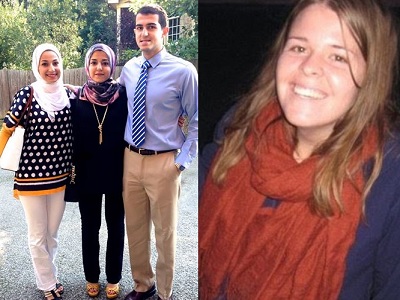
By Basil Abdelkarim
Among this new year’s countless tales of heartbreak and sorrow, two recent tragedies involving young Americans stand out. Last week, we learned that 26-year old humanitarian Kayla Mueller, held captive by ruthless ISIS extremists in Syria, had perished in captivity.
Meanwhile, in Chapel Hill, North Carolina, three young American Muslim students were executed by Craig Hicks, a disgruntled neighbor who had not only posted anti-religion and anti-Muslim sentiments on social media sites but had even displayed a photo of his loaded gun on Facebook.
Local police have reported that the murders of 23-year old Deah Barakat, his 21-year old bride Yusor Abu-Salha, and her 19 year old sister, Razan Abu-Salha stemmed from a long-simmering dispute over parking.
On the surface, these horrific deaths would seem to bear little in common. Kayla, who had traveled to the Syrian-Turkish border to provide humanitarian relief to fleeing Syrian refugees, died in the custody of a brutal extremist group that wraps itself in the mantle of religion. The three students in North Carolina, on the other hand, were murdered by an avowed “anti-theist” extremist whose views on religion according to some reports may have been inspired by such atheist luminaries as Richard Dawkins.
What, then, is the unreported link that connects these seemingly disparate threads?
Simply this: in both instances, the lives of idealistic young people who had committed themselves to philanthropy and humanitarian work were tragically extinguished by individuals driven by anger and hate.
In addition to her work on behalf of Syrian refugees, Kayla Mueller had also worked at an HIV clinic in Arizona, volunteered at a homeless shelter, and spent time in Palestine. Kayla’s courageous work in Palestine with the International Solidarity Movement (ISM) in 2010 remains a glaring omission from most mainstream media descriptions of her life work.
This important part of her humanitarian resume, while flying in the face of the mainstream Palestine/Israel narrative (Israel good, Palestinians bad), merely highlights Kayla’s commitment to the world’s forgotten and disenfranchised.
According to ISM, during her stint with the organization, Kayla helped escort Palestinian children to schools in locales where students faced frequent attacks by fanatic Israeli settlers and military personnel, and she worked with Palestinian civilians non-violently resisting the confiscation and demolition of their homes.
Deah Barakat was a Syrian-American dental student at the University of North Carolina. His young wife (of Jordanian-Palestinian extraction) was scheduled to start dentistry school next year. All three of the Chapel Hill victims were members of the group United Muslim Relief, which led a monthly program that fed local homeless people. Deah also helped raise funds for dental care for Syrian refugees in Turkey and had recently traveled to Palestine to provide free dental care to children with special needs. In every respect, these were model citizens, “the best of the best” as one friend referred to them.
We may never know what possessed Hicks to execute the young students in Chapel Hill. Unlike ISIS, Hicks never filmed his execution (a bullet in the head of each victim) or posted a video sharing a motive for his barbaric act.
The fact that an anti-Muslim bias has been so readily dismissed or at least downplayed by some investigators as a potential motive for Hicks’ crime is deeply troubling. It has not been lost on observers that Chapel Hill students identified strongly with their faith. Both of the murdered young women wore the hijab, and all three were active in local Muslim organizations.
These facts, coupled with Hicks’ outspoken distaste for their Muslim religion, have led many to question whether Islamophobia played a role in the murders. Indeed, many Muslims question a double standard which unfailingly lays blame to all acts of violence committed by Muslims at the feet of their faith - “the problem is with Islam, you see” – while at the same time dismissing the beliefs (or lack thereof) of perpetrators of violence against Muslims as motive for crime.
It should not go unrecognized that while Hicks had parking disputes with other neighbors, and while he espoused hatred for all religions, when he chose to act upon his hatred, he chose Muslims as his targets.
Speculation on motives aside, the deaths of Kayla, Deah, Yusor and Razan are heartbreaking enough. This past month, we lost four wonderful young Americans whose exemplary commitment to serving the less fortunate ought to serve as inspiration for all of us to redouble our efforts to secure justice and dignity for the people they championed, at home in America and abroad.
Last week, speaking of the tragic loss of Kayla Mueller, President Barak Obama declared that she “represents what is best about America”. In truth, all four of these young people represent what is best in our nation.
During their short lives, they touched countless people with their compassion and humanity, in the process revealing a rare side of America few Americans and even fewer people abroad knew existed –an America that cares about the plight of its own less fortunate, as well as Palestinians, Syrians, Africans and others in far off lands struggling in the face of injustice, oppression, and poverty.
The Mueller, Barakat, and Abu-Salha families are now united in their grief and loss, but this is a loss that will also be felt by the many that might have been helped had these young lives not been cut tragically and needlessly short.
– Basil Abdelkarim, MD contributed this article to PalestineChronicle.com.





The tragic deaths of the 3 in US seems to be because of a fanatical atheist but that’s a rare event, so let’s get some balance.
Now who was responsible for Kayla’s death – fanatical muslims.
Who inspires ISIS, Hizbullah, Hamas, Iran’s RG and all the other terrorists to carry out their murders – fanatical muslims.
Who inspires muslim terrorists in France, Belgium, Holland,Australia, England, US, Syria, Iraq, Libya etc to murder others – fanatical muslims.